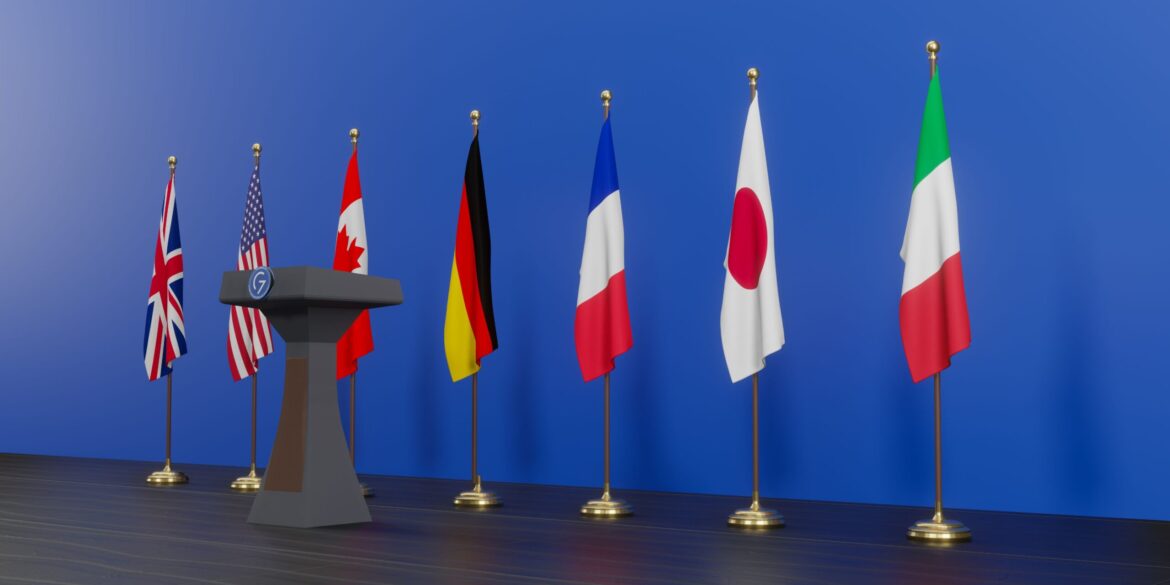Leaders from the world’s major industrialized nations gather in Canada to align sanctions and address global issues
By Bethany Ortiz, Senior Correspondent
The G7 summit in Canada has emerged as a key diplomatic event where world leaders are aligning their approach to imposing sanctions on Russia, amidst ongoing global tensions. With a clear focus on unity and cooperation, German officials have underlined the necessity for a cohesive strategy between the United States and the European Union in their efforts to hold Russia accountable for its actions.
The summit, which convened leaders from seven of the world’s most powerful economies, is seen as an important milestone in maintaining and reinforcing international relations. The participating nations, including the U.S., Canada, Germany, France, Italy, the United Kingdom, and Japan, have pledged to deepen their coordination on sanctions, especially in light of Russia’s continued destabilizing activities in Ukraine and beyond.
Aligning Economic Sanctions: A Unified Front
One of the major objectives of the summit is to present a unified front against Russia. German Chancellor Olaf Scholz has been vocal about the need for a stronger, more synchronized approach between Europe and the United States, particularly in enforcing economic sanctions. This is crucial as Russia continues to evade existing sanctions through alternative economic channels, and the West is seeking new ways to tighten economic pressure.
“Sanctions are an essential part of the strategy to counter Russia’s aggressive actions,” Scholz stated in his opening remarks at the summit. “It is imperative that we continue to work closely with our partners to ensure that these sanctions are effective and far-reaching.”
At the heart of these discussions is the desire to ensure that both the European Union and the U.S. maintain pressure on Russia’s economy, without inadvertently harming their own economic recovery post-pandemic. The ongoing dialogue includes not only military and security measures but also sanctions targeting specific sectors like energy, finance, and technology.
Broader Discussions on Global Stability
In addition to aligning sanctions, the G7 summit is addressing a broader range of global concerns. From security and economic policies to environmental challenges, the leaders are working to craft solutions that will strengthen the global economy and ensure a stable geopolitical environment.
Security remains a key concern, with rising tensions in Eastern Europe and the ongoing war in Ukraine occupying much of the discussions. Canadian Prime Minister Justin Trudeau emphasized the importance of NATO’s role in maintaining peace and security in the region, while also highlighting the need for further humanitarian aid to Ukraine.
“The need for a coordinated global response is clearer than ever,” Trudeau remarked. “As a global community, we must ensure that peace, stability, and the rule of law prevail.”
While Ukraine’s struggle for sovereignty and territorial integrity is at the forefront of these talks, leaders are also focusing on broader issues of international security, particularly in Asia and the Middle East. The G7 nations have emphasized the importance of reinforcing democratic values in the face of rising authoritarianism in countries like China and Russia.
A Focus on Environmental Policies
Environmental concerns are also front and center at the G7 summit. Leaders have reiterated their commitment to tackling climate change, with several countries pledging to increase funding for renewable energy projects and lower carbon emissions. The role of the G7 in leading the charge for global environmental sustainability is a point of unity among the member nations, many of which have made strides toward meeting their climate goals.
The summit’s discussions on the environment align with ongoing international efforts to secure agreements ahead of major climate conferences. As countries continue to grapple with extreme weather events and rising sea levels, the G7’s collective power could drive significant changes in how the world approaches climate issues.
Sanctions and Their Impact on Global Relations
The implications of the G7 summit’s discussions on sanctions will likely resonate far beyond the immediate actions of the participating nations. Russia, which has faced extensive sanctions since its annexation of Crimea in 2014 and its invasion of Ukraine in 2022, is expected to adjust its strategies in response to any new measures that come from the summit. There is also the potential for other nations, such as China, to weigh in on the evolving geopolitical landscape, particularly as Beijing has been working to expand its influence in global affairs.
The success of this summit may also serve as a critical test for the G7’s ability to maintain a united front against Russia and other global challenges in the coming years. The ongoing collaboration between the U.S. and European Union, especially in aligning economic policies, will determine the overall effectiveness of these sanctions.
The effectiveness of these sanctions could also trigger changes in global trade dynamics, particularly as countries and industries seek new alliances and partnerships. The G7 nations, while focusing on punishing Russia, must also manage the delicate balance of global economic relations, ensuring that their actions do not negatively affect their own industries or create long-term economic instability.
Looking Ahead: The G7’s Role in Shaping Global Diplomacy
As the summit continues, the leaders are expected to focus on fostering closer diplomatic ties and addressing critical security concerns that may arise. The outcome of these discussions could significantly shape the future of international relations and global stability, with an eye on continuing efforts to counter Russia’s assertiveness and address the challenges posed by other global powers.
With an emphasis on economic, environmental, and security cooperation, the G7 summit in Canada underscores the importance of international unity in an increasingly divided world. In a time of uncertainty, the collective resolve of the G7 nations will likely play a central role in determining the path forward for global diplomacy.

